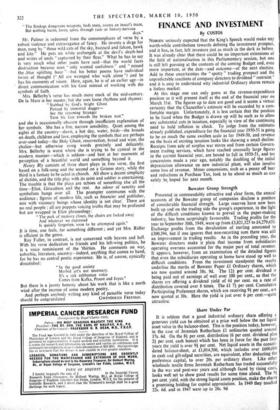FINANCE AND INVESTMENT
By CUSTOS NOBODY seriously expected that the King's Speech would make any worth-while contribution towards defining the investment prospect, and it has, in fact, left investors just as much in the dark as before. It was already clear that there could be no important extensions of the field of nationalisation in this Parliamentary session, but one is still left guessing at the contents of the coming Budget and, even more important, at the date—and outcome—of the next election. Add to these uncertainties the " spotty " trading prospect and the unpredictable reactions of company directors to dividend " restraint" and it is easy to understand why industrial Ordinary shares remain a listless market.
-At this stage one can only guess at the revenue-expenditure position as it will present itself at the end of the financial year on March 31st. The figures up to date are good and it seems a virtual certainty that the Chancellor's estimate will be exceeded by a com- fortable margin. Unfortunately, it is less certain that the position to be faced when the Budget is drawn up will be such as to allow any substantial cuts in taxation, especially in view of the continuing need to hold inflation in check. To judge from the estimates already published, expenditure for the financial year 1950-51 is going to be on much the same swollen scale as for 1949-50, and revenue on the basis of existing taxation looks like showing a small decline. Receipts from sale of surplus war stores and from certain Govern- ment trading services, which have reached unusually large figures in the current financial year, are bound to fall in 1950-51, and tax concessions made a year ago, notably the doubling of the initial depreciation allowance on new industrial plant, will also involve some loss of revenue. Minor concessions, such as a penny off beer and reductions in Purchase Tax, look to be about as much as can safely be hoped for next month.
Bowater Group Strength
Presented in commendably attractive and clear form, the annual accounts of the Bowater group of companies disclose a position of considerable financial slrength. Large reserves have now been built up and on the trading side the group's experience, in the light of the difficult conditions known to prevail in the paper-making industry, has been surprisingly favourable. Trading profits for the year to September 30th, 1949, were up from £3,821,325 to 14,279,653. Exchange profits from the devaluation of sterling amounted to £300,394, but if one ignores that non-recurring sum there was still an improvement in trading results. As in the preceding year, the Bowater directors make it plain that income from subsidiaries operating overseas accounted for the major part of total revenue. It appears, however, from an examination of the detailed figures that.even the subsidiaries operating at home have stood up well to difficult conditions. From the investment standpoint the results underline the merits of Bowater Paper £1 Ordinary shares, which are now quoted around 38s. 9d. The 121- per cent, dividend is being paid out of earnings of well over 100 per cent., so that the shares are offering a dividend yield of 61 per cent. on a rate of distribution covered over 8 times. The Ll 7+ per cent. Cumulative Participating Preference shares, which are receiving 9+ per cent., are now quoted at 30s. Here the yield is just over 6 per cent.—quite attractive.
Share Under Par It is seldom that a good industrial ordinary share offering a generous yield can be obtained at a price well below the net liquid asset value in the balance-sheet. This is the position today, however, in the case of Jeremiah Rotherham £1 ordinaries quoted around 17s. 6d. On the 81 per cent. distribution (6 per cent. dividend plus 21 per cent, cash bonus) which has been in force for the past four years the yield is over 91 per cent. Net liquid assets in the consoli- dated balance-sheet, at £1,014,500, which includes over £600,000 in cash and gilt-edged securities, are equivalent, after deducting the preference capital, to over 20s. per ordinary share. Like other wholesale textile firms Jeremiah Rotherham has traded successfully in the war and post-war years and although faced by rising costs, looks well set to show good results for some time ahead. The 91 per cent. yield, with the strong liquid assets position, make the shares a promising holding for capital appreciation. In 1949 they touched 22s. 6d. and in 1947 were up to 28s. 9d


































 Previous page
Previous page